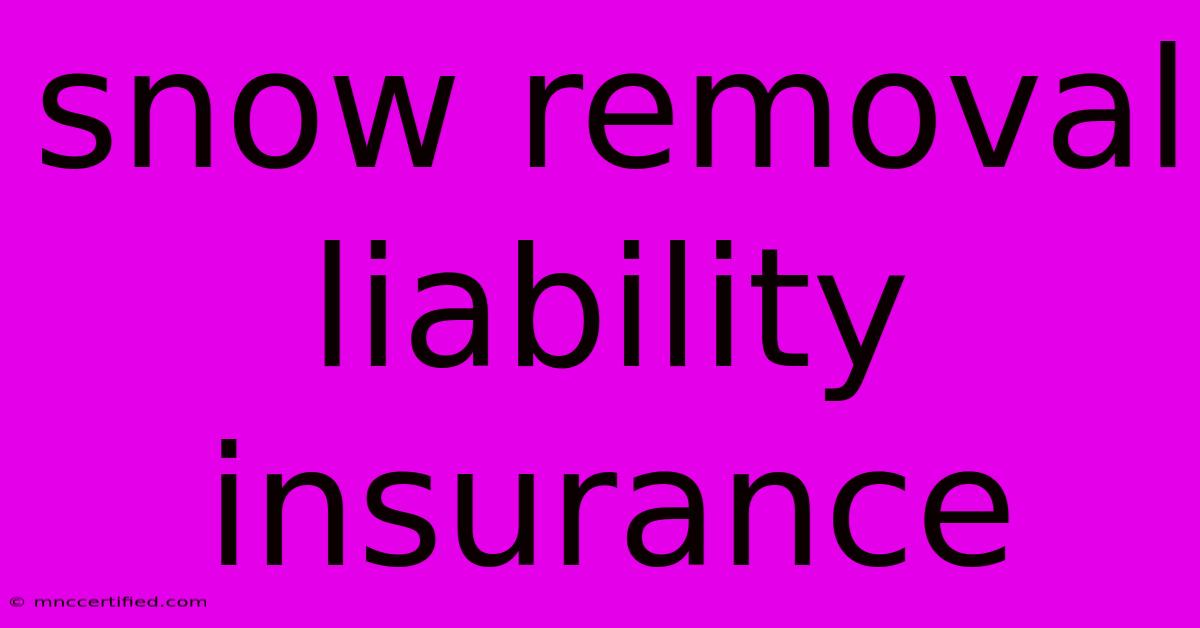Snow Removal Liability Insurance

Table of Contents
Snow Removal Liability Insurance: Protecting Your Business from Winter's Wrath
Winter's icy grip can bring more than just frosty mornings; it can bring lawsuits. For businesses involved in snow removal, the risk of liability is significant. A single slip and fall on a poorly cleared property can lead to expensive legal battles and severely impact your bottom line. That's where snow removal liability insurance comes in. This comprehensive guide explores everything you need to know about this crucial coverage.
Understanding the Risks of Snow Removal
Snow removal, while seemingly straightforward, carries inherent risks. Negligence, even unintentional, can result in serious injuries and property damage. Consider these scenarios:
- Slip and Fall Accidents: The most common liability claim. A customer slips on ice left uncleared near your business, resulting in broken bones or other injuries.
- Property Damage: Your snowplow damages a parked car, a fence, or a building during the clearing process.
- Bodily Injury: An employee is injured while operating snow removal equipment.
These incidents can lead to significant legal fees, medical expenses, and compensation payouts. Without proper insurance, you could face financial ruin.
What Does Snow Removal Liability Insurance Cover?
Snow removal liability insurance, often a component of a broader commercial general liability (CGL) policy, protects your business from financial losses resulting from third-party claims of bodily injury or property damage caused by your snow removal operations. This includes:
- Medical expenses: Coverage for the injured party's medical bills.
- Legal fees: Costs associated with defending against lawsuits.
- Settlement or judgment awards: Payments made to settle or compensate the injured party.
- Lost wages: Compensation for the injured party's lost income due to the injury.
Important Note: Not all CGL policies automatically cover snow removal. Some may require endorsements or specific add-ons. It's crucial to clearly state your snow removal activities when applying for insurance to ensure adequate coverage.
Types of Snow Removal Businesses and Their Insurance Needs
The specific insurance needs vary depending on the scale and nature of your snow removal business:
- Residential Snow Removal: Smaller operations focusing on residential properties might require less extensive coverage than larger commercial operations.
- Commercial Snow Removal: Businesses servicing larger commercial properties, parking lots, or shopping centers will require higher liability limits due to the increased potential for accidents and higher potential payouts.
- Snow Plow Contractors: These businesses generally need more comprehensive coverage due to the use of heavy machinery and potential for significant property damage.
Factors Affecting Snow Removal Insurance Costs
Several factors influence the cost of your snow removal liability insurance:
- Business size and revenue: Larger businesses with higher revenues generally pay more.
- Number of employees: More employees increase the risk of accidents and thus the insurance cost.
- Type of equipment used: Larger, more powerful equipment increases the potential for damage and raises premiums.
- Geographical location: Areas with harsher winters and more frequent snowstorms will typically command higher premiums.
- Claim history: Previous claims can significantly increase your insurance costs.
- Safety measures implemented: Demonstrating a commitment to safety through training programs and preventative measures can lead to lower premiums.
Finding the Right Snow Removal Liability Insurance
Finding the right insurance policy requires careful research and comparison. Here's what you should do:
- Contact multiple insurance providers: Obtain quotes from several insurers to compare prices and coverage options.
- Review policy details carefully: Pay close attention to the policy limits, exclusions, and deductibles.
- Understand your specific needs: Ensure the policy adequately covers your business operations and potential risks.
- Seek professional advice: Consult with an insurance broker specializing in commercial insurance to get personalized recommendations.
Beyond Insurance: Mitigating Risk
While insurance is vital, proactive risk mitigation is just as important. Implement these strategies to reduce the likelihood of accidents:
- Regularly maintain equipment: Ensure all snow removal equipment is in good working order.
- Provide thorough employee training: Train employees on safe operating procedures and emergency response.
- Clear snow and ice diligently: Remove snow and ice promptly and completely to minimize slip and fall hazards.
- Use appropriate signage: Post clear warnings of icy conditions.
- Document your work: Keep detailed records of your snow removal services, including dates, times, locations, and any incidents.
Snow removal liability insurance is not a luxury; it's a necessity. Protecting your business from the financial fallout of accidents is crucial for its long-term survival. By understanding the risks, obtaining adequate coverage, and implementing proactive safety measures, you can navigate the winter months with confidence.

Thank you for visiting our website wich cover about Snow Removal Liability Insurance. We hope the information provided has been useful to you. Feel free to contact us if you have any questions or need further assistance. See you next time and dont miss to bookmark.
Featured Posts
-
Best Nfl Cards To Invest In 2023
Nov 22, 2024
-
Morehead Insurance Rockingham Nc
Nov 22, 2024
-
Giants Jones Practice Squad Safety
Nov 22, 2024
-
Prescotts Legacy Shaping Rayners Career
Nov 22, 2024
-
Free Milk Bags Through Insurance
Nov 22, 2024